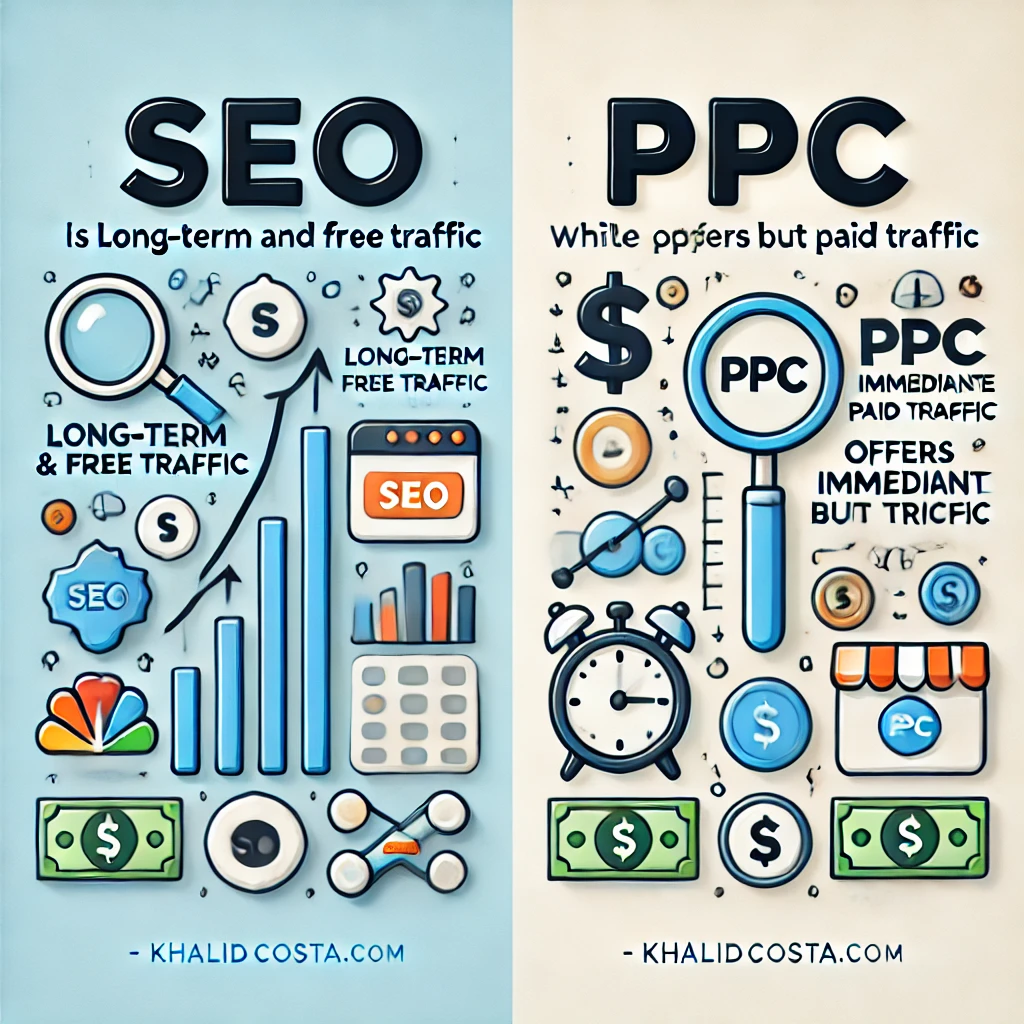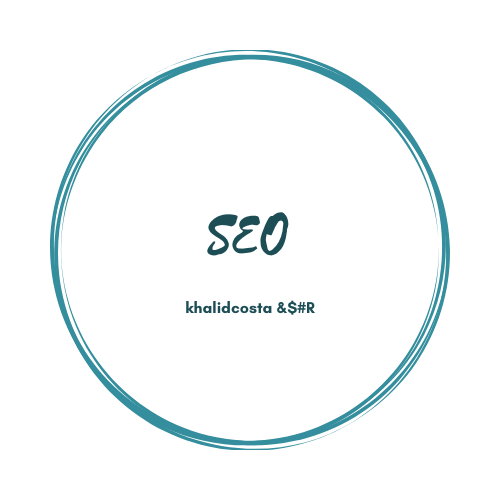
In the fast-paced world of digital marketing, Search Engine Optimization (SEO) and Pay-Per-Click (PPC) advertising stand out. They are two different yet helpful ways for businesses to find their audience. This article will dive into the main differences between them. It will cover the advantages, costs, and success metrics to help you choose the best strategy for your business.

Key Takeaways
- SEO and PPC are two distinct digital marketing strategies with their own unique benefits and considerations.
- Understanding the differences between SEO and PPC can help businesses align their marketing efforts with their specific goals and target audience.
- Factors such as cost, targeted traffic, and quick results should be weighed when deciding between SEO and PPC.
- Combining SEO and PPC strategies can create a synergistic approach that maximizes the strengths of both methods.
- Tracking key metrics for both SEO and PPC is crucial for measuring the success of your digital marketing efforts.
Understanding SEO and PPC
In the digital world, search engine optimization (SEO) and pay-per-click (PPC) advertising are key. They help websites get seen and attract visitors. Each has its own benefits and is important for online success.
What is SEO?
SEO makes your website better for search engines. It uses things like keywords and links to improve your site’s ranking. This way, more people can find your website easily.
What is PPC?
PPC is a way to advertise online. You pay for each ad click. It’s great for getting people to your site quickly, like for sales or leads.
SEO and PPC aren’t rivals; they can help each other. Knowing their strengths helps businesses use them well together. This way, they can reach their online goals more effectively.
Benefits of SEO
Search Engine Optimization (SEO) is key for businesses wanting to succeed online. It helps make your website and content more visible. This leads to more organic traffic and better brand credibility.
SEO boosts your online presence and reach. It uses keywords, content optimization, and technical tweaks to improve your site’s ranking. This makes it easier for people to find your products or services. It also brings in quality leads and helps your business grow.
SEO also offers long-term benefits. It helps you get more organic traffic without relying on paid ads. This makes your marketing strategy more cost-effective and efficient.
Effective SEO also makes your brand more credible and trustworthy. When your site shows up high in search results, it looks authoritative. This can make customers trust your brand more, leading to higher loyalty and conversion rates. It gives you a strong edge over competitors.
Advantages of PPC
Pay-per-click (PPC) advertising has many benefits for businesses of all sizes. One big advantage is getting quick results with your digital marketing. Unlike SEO, which takes time, PPC can bring targeted traffic to your site fast.
PPC also lets you target specific audiences looking for your products or services. By using keyword research and audience targeting, your ads reach the right people at the right time. This makes your advertising budget work harder.
The quick results with PPC and targeted traffic make it a strong tool for businesses. It helps boost your online presence and drive conversions. By using PPC’s unique benefits, you can get ahead of the competition and see success quickly.
الفرق بين seo and ppc
Both search engine optimization (SEO) and pay-per-click (PPC) aim to increase website traffic. But they use different methods, have different costs, and have different long-term effects. *SEO* works on making your website rank better in search engines. *PPC* involves paying for ads to get more visibility.
The main difference is how they bring in traffic. *SEO* makes your website better for search engines, which can keep bringing in visitors over time. *PPC* ads give quick visibility but need constant money to keep showing up.
Cost is another big difference. *SEO* needs money upfront for content and website work, but it can pay off in the long run. *PPC* costs money for each ad click, which can add up fast, especially in competitive markets.
Choosing between *SEO* and *PPC* depends on your business goals, budget, and who you want to reach. Knowing the differences between SEO and PPC helps you pick the best strategy for your business. This way, you can get the most out of your digital marketing efforts.
Combining SEO and PPC Strategies
Digital marketers know the value of mixing SEO and PPC strategies. A synergistic approach to SEO and PPC makes online marketing stronger. It boosts presence and drives better results.
Synergistic Approach
The synergistic approach to SEO and PPC uses each tactic’s strengths. SEO builds long-term visibility and authority. PPC brings quick, targeted traffic. Together, they make a strong marketing team.
For example, combining SEO and PPC reveals top keywords for both organic and paid traffic. This knowledge guides content, link building, and ad targeting. It makes your digital marketing more cohesive and effective.
By using a synergistic approach to SEO and PPC, you avoid risks of one strategy. If organic rankings change, PPC keeps visibility and drives sales. PPC also tests new keywords and messages for SEO.
Cost Considerations
When it comes to cost of SEO and cost of PPC, your budget matters a lot. The budget for SEO and PPC needs careful planning for a good return on investment.
The cost of SEO changes based on project complexity, industry competition, and tactics used. A full SEO plan can cost from a few hundred to several thousand dollars monthly. Yet, SEO’s long-term gains often justify its cost for many businesses.

Cost of PPC is clearer, based on the cost-per-click for your keywords. Your budget for SEO and PPC depends on your industry and target audience’s location. Even with a smaller budget, a smart PPC strategy can still bring great results.
Finding the right mix of cost of SEO and cost of PPC is key. By smart budgeting and resource allocation, you can craft a winning digital marketing plan. This plan will help you achieve your goals and get a strong return on investment.
Measuring Success
Evaluating the success of your SEO and PPC efforts is key for a better digital marketing strategy. By tracking SEO metrics and PPC metrics, you can understand your campaigns’ performance. This helps you make smart choices to boost your measuring SEO success and measuring PPC success.
Key Metrics for SEO
For SEO, focus on organic traffic, keyword rankings, and conversion rates. Organic traffic shows how well your SEO brings visitors to your site. Keyword rankings reveal what topics and phrases your audience likes, guiding your SEO strategy.
Conversion rates tell you about the quality of your traffic and your site’s effectiveness. This helps improve your content and user experience.
Key Metrics for PPC
For PPC, track click-through rate, cost-per-click, and return on ad spend. Click-through rate shows how engaging your ads are. Cost-per-click helps you manage your ad budget effectively.
Return on ad spend shows if your PPC campaigns are profitable. This helps you decide where to invest in future ads.
Staying Ahead of the Curve
In the fast-changing world of digital marketing, staying up-to-date with SEO and PPC is key. Search engines and ad platforms keep updating their rules. It’s vital to be ready to adapt to changes in SEO and PPC. This way, you can keep up with the competition and get the best results from your marketing.

To stay ahead, keep an eye on the latest news and updates from trusted sources. This lets you stay ahead of new trends and changes. It also helps you find new ways to connect with your audience.
By staying up-to-date with SEO and PPC and being open to adapt to changes in SEO and PPC, your business can thrive. Being proactive and flexible with your strategies will keep you ahead. It will also help you achieve your marketing goals.
Conclusion
Understanding the difference between SEO and PPC is key to a good digital marketing plan. By looking at what each offers, businesses can pick the right approach. This helps them reach their goals and grow online.
SEO gives you long-term visibility and organic traffic. PPC offers quick results and targeted ads. Together, they create a strong online presence that meets your audience’s needs.
Whether you want to boost your brand, get more website visitors, or increase sales, knowing the conclusion SEO vs PPC and summary of SEO and PPC differences helps. It lets you make smart choices and build a successful digital marketing strategy.
FAQ
What is the difference between SEO and PPC?
SEO helps your website rank better in search results without paying. PPC, on the other hand, is a paid ad service. You pay each time someone clicks on your ad, bringing more visitors to your site.
What are the benefits of SEO?
SEO boosts your website’s visibility and brings in more visitors over time. It also makes your brand more credible. By optimizing your site, you can attract more qualified leads.
What are the advantages of PPC?
PPC ads offer quick results and let you target specific audiences. They help you quickly get more visitors to your site. This is great for reaching people who are already looking for what you offer.
How can I combine SEO and PPC strategies?
Combining SEO and PPC can be very effective. This approach uses both tactics to enhance your online presence. It helps drive better results and reach more people.
How do I measure the success of my SEO and PPC efforts?
To gauge success, track specific metrics for SEO and PPC. For SEO, watch organic traffic, keyword rankings, and conversion rates. For PPC, focus on click-through rate, cost-per-click, and return on ad spend.
How can I stay ahead of the curve with SEO and PPC?
The digital marketing world changes fast. Search engines and platforms update often. To keep up, stay informed about new trends and best practices. Be ready to adjust your strategies as needed.

